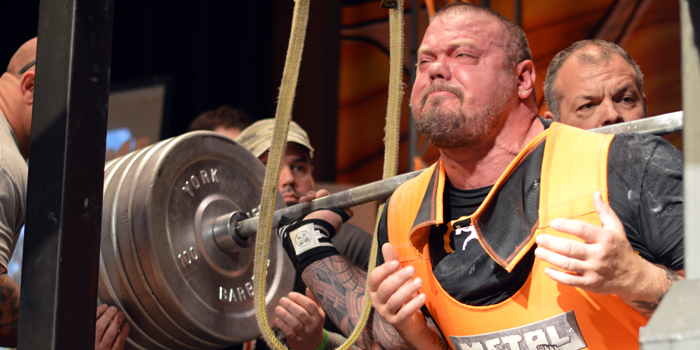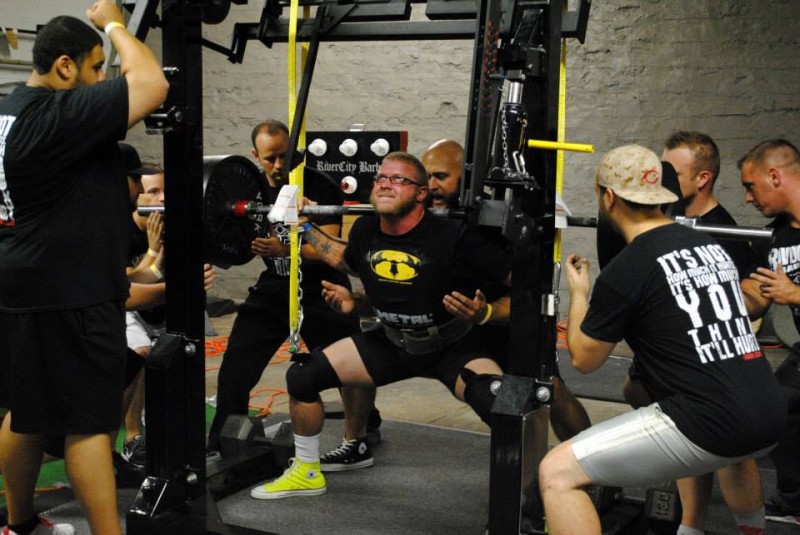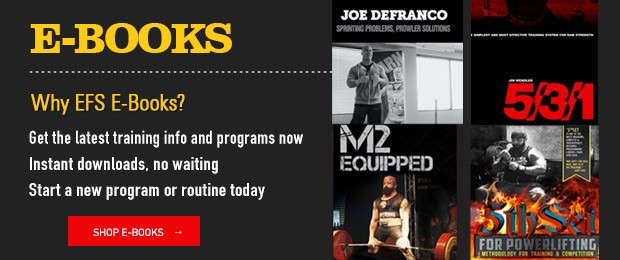
During one of our recent training sessions, one of my good friends and a fellow training partner/coach and I were having a conversation about some of the newer lifters at our gym and whether or not they would be successful at their upcoming meets. He and I have been together for years and have had many such conversations before. Almost always, we are right about predicting the future. I once told a new lifter at our gym that his first meet would be good, and his second meet would be great. Indeed it was; he totaled Pro and was top 10 in his weight class in that second meet, and this was only a year and a half after his first powerlifting training session. I would hazard a guess that these conversations happen at most powerlifting gyms, and the veterans that have been around a while are all probably very good at making these predictions. And I would also bet that what they used to make these calls is rarely all physical, but rather the intangibles, mostly mental. Seems strange for a totally physical sport, right? Let me explain why it isn't.
RECENT: Turning Passion Into Business: Running A Private Powerlifting Gym
Show me a weak point, and I'll show you an accessory movement to fix it. Show me bad form, and I'll bet I've seen and fixed worse. Show me a bad attitude, a problem with dealing with failure or setbacks, and a bad work ethic, and I'll ask you to find another hobby. I've been fortunate enough to train alongside, compete against, and coach some really great lifters. While all vastly different people, there are some commonalities between the people that make it to the top, and most are on the mental side. Take a look at some of the traits below, and ask yourself if they fit you. If not, fake it until you make it and I promise that you won't be disappointed.
Be Open to Coaching But Know When to Freelance
The role of a coach is to help you get the easy pounds. If you've ever been in a decent gym, you know that small changes can make big differences, even for people who have been lifting a long time. It's not uncommon for a change in foot placement to yield 10-20 pounds to a squat. Changing a grip width can add 5-10 pounds to a bench press. A good coach can see and prescribe the right changes that can add weight to the bar without the lifter actually getting stronger.
Same with accessory moves; I've seen a lifter go from not being able to hold form on a squat to hitting massive PR's in a handful of weeks by simply fixing one weak point. The best lifters are the ones that can take this advice and put it to work within the confines of their program, and think outside of the box to further improve. Great lifters instinctively know what rep ranges work the best for their accessory movements. They can dictate rest periods and frequency. They know by feel what exercises yield results, and they can typically give rationale for why they do what they do. They sense when movements have ran their course and need to be replaced.
Great lifters also know when to rely on their instincts and put themselves in the best position to succeed when the weights get heavy. I have often told lifters to concentrate on technique during warm-ups, and after 90%, just focus on completing the lift. This doesn't mean that technique goes out the window, but it means that you have to trust your body to do the right thing. Gravity has a way of throwing things off track, but the form breakdown should be minor if at all as things get heavier.
Know and Understand Your Role
For a powerlifter, you should always be striving to be the biggest fish in the biggest pond. The best learning opportunities come when you are able to surround yourself with people stronger than yourself, and work to catch them. That being said, respect the hierarchy. If you are the 10th best lifter at the gym, you are likely to be treated as such. This means that the amount of coaching time you get is limited, and you have to find a way to add value as you progress. At this level, you should be helping those below you, and watching those above you to figure out how they got to where they are. Be the first to show up and the last to leave. Spot and load without being asked. Take initiative and lead. Show that you are committed. This will get you further with your peers than any PR ever will.
RELATED: Expanding My Circle of Training Knowledge
A word here about genetics. I have always been interested in fast cars, and performance mods on cars are a good analogy for how different people react in the gym. The example here would be the stock Honda Civic vs. the stock Ford Mustang. I drove a Civic in high school and I knew that adding a performance exhaust would net me a small gain in horsepower. My good friend drove a Mustang, and a performance exhaust would give him 50 horsepower. That said, I've seen some Honda Civics that are very fast, but they have a lot more work and time put into them. My point here is that if you were born a Honda Civic (as I was), be realistic and understand that you aren't going to progress at the rate of someone born as a Mustang. If you're in my camp, become an absolute technician. Your form better be spot on, and you better be knowledgeable, but you can do very well if you have the desire.
Always Have a Plan, and Execute It
Great lifters do always come equipped with a plan. Each training session is thought out in advance and goals are set. If it's a max effort day, the goal is a particular weight (and it's realistic). If it's a sub-max day, there is consideration to how the weights should move or feel. PR’s are recorded and managed, and variables are kept in consideration. Great lifters very rarely miss weights in training. They know when to push, and when to back down. It’s always better to leave weight on the table than to overshoot your capabilities. Often times, it is best to develop a goal and work backwards. If the goal is to squat 500 in the meet, you should have a rough idea of how much you would need to work with for sets of three and five and on variations to achieve that goal. Rarely should you be surprised on the negative side. If anything, expectations should be exceeded come meet day.
As with any sport, a lot is known about powerlifting but a lot remains unknown. Advances happen all the time, and what works for someone today might not work for them tomorrow as they get stronger and or older. We all must keep an open mind and be willing to change and adapt as time moves forward. Great lifters are open to ideas from any place they can get them, and they decide what to take and what to leave. If it works, it is kept. If not, it is discarded and possibly revisited later. In my 10 years of powerlifting, I have seen some really gifted people go nowhere, and some really poorly suited people do very well.
Again, mindset is everything. Embrace the struggle and enjoy the journey. Come in with a plan, and the results will follow. Master the mental side, and the physical side will be easy.
Zac Whalen has been ranked in the top 10 nationally for each of the last 4 years in the 220lb weight class. His best lifts in competition are 865 Squat, 625 Bench Press, and 685 Deadlift for a 3 lift total of 2175. In 2012, he co-founded RiverCity Barbell in Newport KY. The gym’s goal is to empower our members to master the technique needed to safely and effectively perform the movements, and eventually evolve to be able to coach other lifters on how to do the same.










